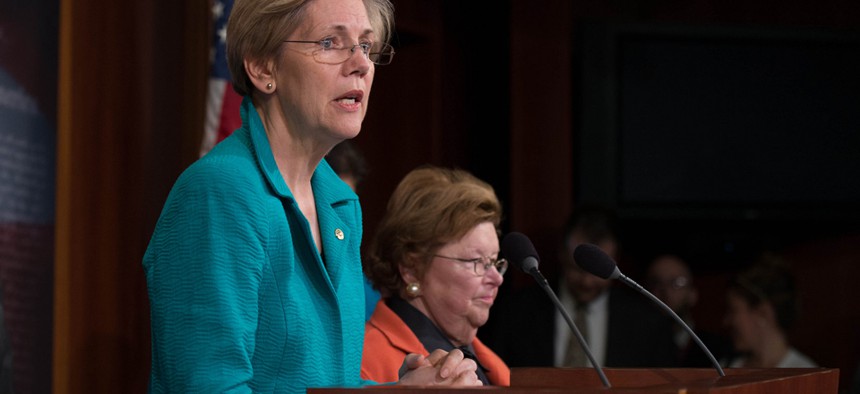
Democratic Caucus of the United States Senate
Why Elizabeth Warren Probably Isn’t Running for President
History shows that Senate leaders have a tough time becoming chief executives.
Let's begin by stating the obvious: Sen. Elizabeth Warren has said, multiple times, that she is "not running for president"—although she has softened her tone on the subject in recent interviews.
But! Warren boosters took some heart in news that broke Thursday, that Warren would be named to a newly created leadership role in the Senate's Democratic Caucus. In her new spot, Warren will play a "key role" in shaping her party's policies on the minimum wage, Social Security, and student loans.
Shortly after the announcement, the Progressive Change Campaign Committee, a big booster of Warren and Warren-esque politicians, blasted an email out to its followers: "BREAKING: Warren in Senate Leadership!!!"
The PCCC is the closest thing to an Elizabeth Warren fan club (hence the three exclamation points). The group helped draft Warren to run for the Senate against Scott Brown in 2012, and helped her beat him. Its nearly 1 million members would love to see her run for higher office in 2016.
"This is a good reminder that when we invest early in progressive leaders, it's not just about winning elections in the short term—it's about building power over time," PCCC's cofounders, Adam Green and Stephanie Taylor wrote, in the email.
Warren already has wide appeal among the progressive base, and its attendant donors. Her new leadership role will only give her more national exposure. But does it signal that she wants to pursue even higher leadership positions? History says no.
In the past 50 years, just three senators have gone on to become president: Lyndon B. Johnson, Richard Nixon, and a little-known senator from Illinois named Barack Obama. By comparison, four governors (Jimmy Carter, Ronald Reagan, Bill Clinton, George W. Bush) and three vice presidents (Johnson, Gerald Ford, George H.W. Bush) have gone on to the Oval Office.
Congress's popularity—or lack thereof—is another important factor. At a time when voters' confidence in Congress's ability to get things done hovers near historic lows, it's difficult to see a clear path from Capitol Hill leadership to the White House. That path gets even more complicated when you factor in leadership positions—while Obama, as a new senator, was able to run from Congress relatively unencumbered, that's much tougher for veteran senators or leaders.
Joe Trippi—a veteran Democratic strategist who worked on the presidential campaigns of Edward Kennedy, Walter Mondale, and John Edwards—said Senate leadership is a signal that Warren does not have presidential ambitions in mind.
"It makes no sense for her to do this and run for president," Trippi told National Journal. "It may be a great place to get things done, to move your policies, to put your issues in a better position to actually be implemented. But as a platform to run for president? I wouldn't have advised her to do it."
The most recent Senate leader to run for president was Bob Dole in 1996. Before running, he had served as Senate minority leader for eight years, and majority leader for a combined three. Sheila Burke, Dole's former campaign manager, told National Journal that Dole's work as majority leader was a "clear distraction" from his presidential campaign. Dole eventually gave up his Senate leadership role to focus on the campaign, but still lost to Clinton in an Electoral College landslide.
Aside from the added work, another challenge that Senate leaders face when seeking higher office is being challenged on positions they may not even support. Majority and minority leaders in the Senate are often tasked with representing their caucus as a whole, which may not always align with their personal (or preferred) views.
"You're often in a position of having to build consensus around an issue which might not entirely reflect where you would go individually," Burke said. "[Dole] was certainly challenged in terms of being held accountable for positions that were being taken by the caucus or things he was trying to build consensus around that might or might not have been consistent with where he wanted to position himself for the campaign."
But does being a member of the Senate leadership make you any more vulnerable to attacks than being a veteran senator, à la John McCain or John Kerry?
"Absolutely," Burke said. "You are less free to move independently than you are as a free-standing senator. It has its positive elements as well: having as much exposure, being on the floor, being quoted, being sought after for comment. But the downside is, you're sought after for comment."
For those holding out hope for Warren 2016, however, there are some caveats. Her new position will be in the leadership, but she won't be a capital-L "leader." That means she won't have as much responsibility as Reid, and won't necessarily have to vote with her caucus on every issue. It's not yet even clear exactly how the new position will work, and how it will fit in with the Democrats' Senate leadership team in practice. "Nobody's clipping my wings," Warren told The Huffington Post after her appointment.
"Elizabeth Warren is the natural leader of the party right now—whatever title they decide to give her in the Senate," Kate Albright-Hanna, deputy campaign manager of the Ready for Warren PAC, told National Journal. "I don't think another leader has been as perfectly matched to the times since Teddy Roosevelt and FDR."
One Democratic-aligned strategist even suggested that the lack of historical precedent for Senate leaders becoming president is irrelevant today. After all, there were just two women in the Senate when LBJ was elected. "There is really no conventional wisdom for Democratic women in the Senate—they've only been elected to be there since 1985!" the strategist said.
But Trippi threw some cold water on that optimism.
"I just see it as her wanting to have an impact on policy, and I think reading into it something other than that—about a run for president or putting herself in position for 2016—would be mistaken," he said.
Warren's new job may be a great way for her to promote her more-liberal policy proposals within her party. And in return, her party will get to hitch its wagon to her star. That association with the establishment isn't a political problem for Warren the senator; she's in a relatively safe seat, and she has a clear philosophical vision for her party. But it does dampen the chances of us seeing Warren the Presidential Candidate emerge any time soon.
This article appears in the November 17, 2014 edition of NJ Daily.







